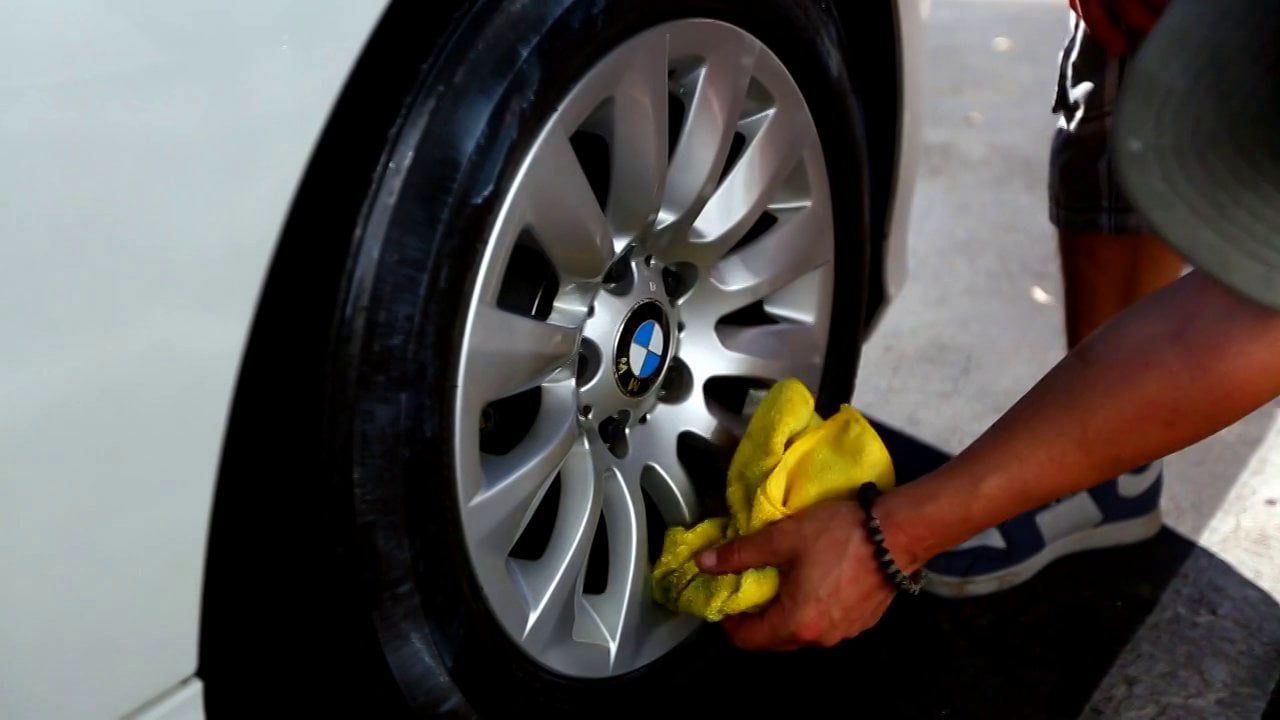First Aid Wheels' Guide to Simple Alloy Wheel Cleaning Hacks
Alloy wheels are a fantastic addition to your car. Not only do they enhance vehicle performance; they also look the part and often draw admiring glances from onlookers. Indeed, many drivers take great pride in owning a vehicle that is equipped with alloys, so they’ll want to ensure that the quality of the wheels does not diminish.
It’s important, therefore, to clean your alloys regularly, as stains like brake dust and oil can settle permanently if not removed quickly. If you’re going to clean your alloys, you may as well do it right, so learn how to get the best possible clean on your wheels. It will save you having to do it too often!
How to clean alloy wheels: the process step-by-step
Part 1: Cleaning
- Rinse the wheels to remove loose dirt and brake dust. A fire hose nozzle emits a powerful stream of water, but not so forceful as to damage the wheels.
- Spray each wheel separately with a fit for purpose alloy wheel cleaner. As they are non-acidic, they won’t affect the finish of the wheels.
- Agitate the wheel with a soft-bristled wheel brush, which will loosen grime and brake dust but doesn’t scratch the finish. Ensure to reach through the spokes so that they are cleaned both front and back.
- Clean the lug nuts (both outside and inside the holes) while ensuring that the wheel is wet. If you let wheel cleaner dry into the wheel, it will leave spots on the finish.
- Spray the wheel wells with an all-purpose cleaner, as they are likely to have accumulated dirt and mud. This will probably require a stronger cleaner than what you used on the wheels. It helps to agitate the wells first with a long-handled, sturdy-bristled brush.
- Rinse the entire wheel (including wells, lug nuts and between the spokes).
- Dry the wheel with a clay lubricant or chamois cloth, which will remove any lingering stains but is still gentle on the wheel.
- Repeat as above for the other wheels.
Part 2: Claying
- Once the wheels have been cleaned, it’s then advisable to spray them generously with a clay lubricant to remove stubborn contaminants.
- Take a quarter of a medium-grade detailing clay bar, flatten it into a patty and rub over the wheels, ensuring to apply it between the spokes.
- Fold the clay bar over to a clean side and use it to remove any clay residue before wiping the wheels clean.
Part 3: Polishing
- Wipe metal polish onto each wheel separately. Your choice of polish should be determined by the surface metal of your alloys.
- Attach a polishing powerball to a drill and spread the polish throughout the wheel, slowly at first before gradually increasing the speed. Keep using the powerball until the polish begins to dry or fade.
- Wipe the wheel clean with a microfibre towel and then repeat each step for the other wheels.
Part 4: Waxing
- After the wheel has dried, seal the surface of the wheel with a quality wheel protectant.
- Apply the wheel protectant with an applicator pad and then buff the wheel. This will give it a nice shine while also preventing brake dust adhesion.
- Repeat this process on a regular basis.
Part 5: Dressing
- Choose a tyre dressing based on whether you want a glossy shine or a long-lasting protectant.
- Follow the directions as specified by your chosen dressing’s label.
- Apply coats thinly and allow the dressing to dry in fully before you drive the vehicle.
- Ensure that you don’t ‘pool’ the dressing around raised letters and white walls.

Regular alloy wheel cleaning is essential.
Alloy wheel cleaning hacks
While you should clean alloy wheels thoroughly using recommended cleaning products, some stains could be removed by home solutions.
- Aluminium tinfoil & cola: If you have rust spots that need removing, this mixture works excellently. Soak a piece of aluminium foil (also called tinfoil) in some cola and rub it against the rust like you would if you were sanding a piece of wood.
- Vinegar: Lingering grease can affect the quality and appearance of your alloys, but it can be removed with an application of white vinegar on a microfibre cloth. Cider also works well for this purpose.
- Lemon juice: If you’ve managed to remove the toughest stains from your alloys, why not make those clean wheels even more distinctive by adding a splendid shine? Squeeze some lemon juice onto the alloys (or apply with a cloth) and leave it sit for 10 minutes before rinsing off with water.
- Oven cleaner: Brake dust is quite hard to eliminate, even with plentiful scrubbing, but an oven cleaning product can remove this stubborn stain. Shake the container, spray it into the wheels (be careful not to get any on the bodywork of your vehicle) and leave it for a few minutes before a quick scrub and hosing.
- Baking soda: When allowed to set into your wheels, rust can be damaging, so baking soda is an ideal home remedy. Mix with water to create a paste, apply the mixture to your wheels and rinse off afterwards.
- Baby oil: For shiny, rust-free alloy wheels, you could do a lot worse than apply a dab of baby oil on a cotton cloth. Dab is the operative word here as you don’t want to go overboard on the quantity, and it’s especially important not to get the oil on your tyres.
- WD40: Few products remove tar better than WD40. Spray the substance onto affected areas of the wheels and scrub with a stiff brush before rinsing with a hose, as any lingering WD40 could seep onto the tyre and make it dangerously slick.
Tips for cleaning alloy wheels
- Never clean alloy wheels with abrasive products, polishing compounds or steel wool. These will harm the quality and longevity of your alloys.
- If you avail of an automatic car wash, find out if it uses acid-based cleaners or heavy duty brushes, as these could ruin your wheels.
- Don’t wash your wheels until they have cooled, as the heat will evaporate the water and leave soap spots on your alloys. Spraying a wheel when it’s hot could warp your brake pads, too.
- Never steam-clean your wheels, as this could harm their finish.
- Change the cloth with which you clean your alloys after each cleaning so that you don’t scrape the wheels with particles that the used cloth had already gathered from the wheels.
- Apply a good wheel wax at least once every three months for enhanced protection and shine.




